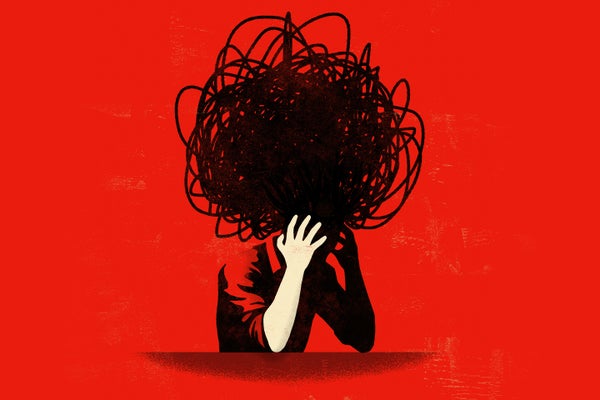
WWW.SCIENTIFICAMERICAN.COM
Bad Sleep Leaves the Brain More Vulnerable to Intrusive Thoughts
January 9, 20253 min readHeres Why Bad Sleep and Toxic Thoughts Go Hand-in-HandFindings reveal the memory-related brain processes that generate unwanted thoughts when people are sleep deprivedBy Rachel Nuwer edited by Gary Stix Rob Dobi/Getty ImagesImagine you are attending a friends housewarming party, andin front of everyoneyou spill a glass of red wine on their brand-new white couch. You are so mortified that every time you see this friend afterward, you immediately think of the couch mishap.Research has shown that how you react to that unwelcome recollection will depend on how much sleep you get. If youre well rested, your brain will be able to quickly suppress the negative memory. But if you are someone who is plagued by insomnia, then intrusive thoughts about what happenedand the unpleasant emotions attachedwill probably continue to bother you for some time.Now a new study published in Proceedings of the National Academy of Sciences USA provides insight into what, exactly, goes wrong in the sleep-deprived brain when such unwanted thoughts intrude. This could be an important piece of the puzzle in understanding why it is that people who are chronically sleep-deprived become at high risk of developing mental health problems, says Scott Cairney, an associate professor of psychology at the University of York in England and senior author of the findings.On supporting science journalismIf you're enjoying this article, consider supporting our award-winning journalism by subscribing. By purchasing a subscription you are helping to ensure the future of impactful stories about the discoveries and ideas shaping our world today.Cairney and his colleagues showed in an earlier study that sleep deprivation impairs peoples ability to suppress unwanted thoughts. But the team wanted to take those behavioral observations one step further, he says. Whats actually going on under the hood, in the brain, when people are not getting enough sleep?Previous research has demonstrated that the retrieval of memories of past events involves the hippocampus and that of a different part of the brain, the right dorsolateral prefrontal cortex (rDLPFC), is responsible for suppressing that retrieval process. Cairney and his colleagues hypothesized that sleep deprivation impairs the rDLPFCs ability to slam the breaks on the retrieval processes, he says.To test this, the researchers recruited 85 students. First, the team trained them to associate images of neutral faces with specific scenes, some of which were negative, such as a car crash or a fight. They form a rich connection between the face and the scene, so when you present them with the face in isolation, their brains will automatically engage in a retrieval process, Cairney says.Next, the researchers divided the participants into two groups. One group was made to stay up all night while the other was allowed to sleep in beds in the lab. Participants in the latter group were monitored for how much time they spent in rapid-eye-movement (REM) and non-REM sleep.In the morning all of the participants were shown images of the faces they had been previously trained with, but this time, the participants had to either think about the memory they had been trained to associate with the face or to suppress it. Throughout this task, their brain activity was measured using a functional magnetic resonance imaging (fMRI) scanner.The results confirmed Cairney and his colleagues hunch. Compared with the participants who had slept, those who had stayed up all night had significantly diminished rDLPFC activity when they were supposed to be suppressing intrusive thoughts. Conversely, activity in their hippocampus was elevated, likely because the rDLPFC was not shutting down the retrieval process it was engaging in. This finding showed that sleep deprivation does not cause a general decline in brain activity, Cairney says, but rather seems to specifically affect certain parts of the brain that are involved in executive function.Out of the participants who had slept the night before, the researchers also found a significant positive correlation between the amount of time they spent in REM sleep and rDLPFC activity, specifically when they were engaging in the memory suppression task. Thats interesting because many disorders associated with debilitating intrusive thoughts, such as depression and PTSD, are also associated with disturbances in REM, Cairney says.The intriguing new study suggests a key role that REM sleep seems to play in maintaining adequate memory control, says Zara Bergstrm, a cognitive psychologist at the University of Kent in England, who was not involved in the work. She adds, however, that it will be necessary for future research to manipulate REM sleep directly to confirm whether it does have a causal role in controlling memories and thoughts.Maria Wimber, a cognitive neuroscientist at the University of Glasgow, who also was not involved in the research, adds that the new studys findings have real potential to inform therapeutic approaches.Interventions that enhance REM sleep could become part of the therapy for disorders that are characterized by intrusive memories, like post-traumatic stress disorder, she says. This type of response might also be attempted for acute traumaa possible preventive measure to ensure that toxic memories and flashbacks never emerge at all.
0 Commentarios
0 Acciones
146 Views


